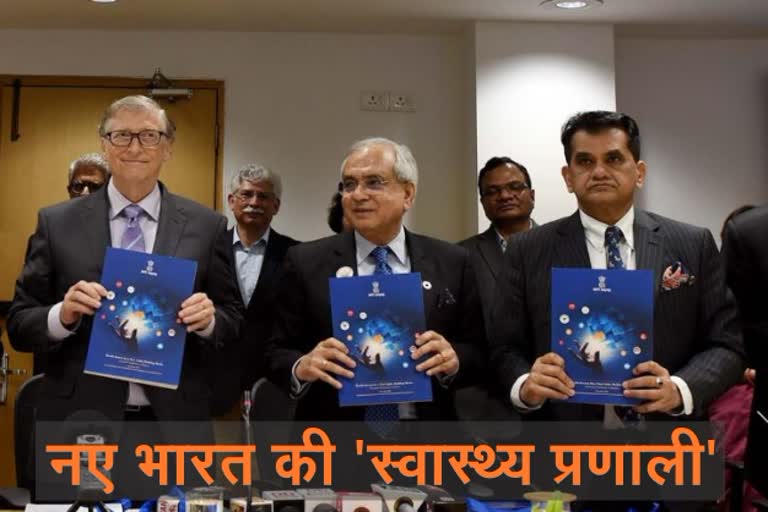नई दिल्ली : सरकार अब मध्यम वर्ग के लिए स्वास्थ्य व्यवस्था तैयार करने पर विचार कर रही है. यह व्यवस्था उन लोगों के लिए होगी, जो अब तक किसी सार्वजनिक स्वास्थ्य प्रणाली के दायरे में नहीं आते. नीति आयोग ने इसकी रूपरेखा जारी करते हुए यह बात कही.
गौरतलब है कि इस नयी स्वास्थ्य प्रणाली में उनको शामिल नहीं किया जाएगा, जो आयुष्मान भारत योजना के दायरे में हैं. हाल में शुरू इस योजना के दायरे में कुल आबादी का 40 प्रतिशत आता है. ये वे गरीब लोग हैं, जो स्वयं से स्वास्थ्य योजना लेने की स्थिति में नहीं हैं.
ब्लाक निर्माण-सुधार
नीति आयोग ने नए भारत के लिये स्वास्थ्य प्रणाली 'ब्लाक निर्माण-सुधार के लिये संभावित मार्ग' शीर्षक से रिपोर्ट जारी करते हुए यह बात कही. यह रिपोर्ट नीति आयोग के उपाध्यक्ष राजीव कुमार ने जारी की. इस मौके पर बिल और मेलिन्डा गेट्स फाउंडेशन के सह-अध्यक्ष बिल गेट्स भी मौजूद थे.
स्वास्थ्य प्रणाली का खाका तैयार करना है मकसद
इस मौके पर नीति आयोग के सलाहकार (स्वास्थ्य) आलोक कुमार ने कहा कि रिपोर्ट का मकसद मध्यम से दीर्घ अवधि के लिये मध्यम वर्ग से जुड़े लोगों के लिये के स्वास्थ्य प्रणाली का खाका तैयार करना है.
इसमें मध्यम वर्ग पर गौर किया गया है क्योंकि गरीबों के लिये पहले ही आयुष्मान भारत योजना शुरू की जा चुकी है, जबकि जो आर्थिक स्थिति से सबल हैं, वे चिकित्सा खर्च को उठाने में सक्षम हैं.
स्वास्थ्य व्यवस्था की हो देखभाल
कुमार ने कहा, करीब 50 प्रतिशत आबादी अब भी किसी सार्वजनिक स्वास्थ्य व्यवस्था से जुड़ी नहीं है...उनके लिए उनसे मामूली राशि लेकर ऐसी प्रणाली तैयार करने का विचार है जो मध्यम वर्ग की स्वास्थ्य देखभाल जरूरतों को पूरा कर सके.
उन्होंने कहा कि मध्यम वर्ग में आने वाले लोगों को अगर देश में बेहतर स्वास्थ्य सुविधा व्यवस्था के निर्माण के लिये 200 या 300 रुपये देने पड़ते हैं, तो उन्हें कोई समस्या नहीं होगी. यह योजना व्यवहारिक लग रही है.
भारत का भविष्य उज्जवल
इस मौके पर बिल गेट्स ने कहा कि युवा आबादी के कारण भारत का भविष्य काफी उज्ज्वल है. उन्होंने रेखांकित किया कि किसी भी देश की मानव पूंजी वहां के नागरिकों के स्वास्थ्य, शिक्षा और पोषण पर किये गये कुल निवेश का जोड़ है.
हमारा दृष्टिकोण : स्वस्थ भारत
नीति आयोग के उपाध्यक्ष राजीव कुमार ने कहा, हमारा दृष्टिकोण स्वस्थ्य भारत का है और सभी के लिये गुणवत्तापूर्ण स्वास्थ्य के लिये हमें स्वास्थ्य सेवा के हर मोर्चे पर स्वास्थ्य सेवा की डिलिवरी व्यवस्था में निजी एवं सार्वजनिक दोनों स्तरों पर व्यापक बदलाव की जरूरत है.
पढ़ें : प्रजा फाउंडेशन ने 'दिल्ली में स्वास्थ्य की स्थिति' पर रिपोर्ट की जारी
स्वास्थ्य का एजेंडा
इस रिपोर्ट में भविष्य की स्वास्थ्य प्रणाली के पांच मुख्य क्षेत्रों को चिन्हित किया गया है. जन स्वास्थ्य का अपूर्ण एजेंडा पूरा करना, बड़ी बीमा कंपनियों में निवेश करके व्यक्तिगत स्वास्थ्य व्यय को घटाना, सेवा वितरण को आपस में जोड़ना, स्वास्थ्य सेवा का बेहतर खरीददार बनाने के लिए नागरिकों का सशक्तिकरण करना और डिजिटल स्वास्थ्य की शक्ति का लाभ पाना इनमें शामिल हैं.
5 लाख का बीमा कवर
उल्लेखनीय है कि प्रधानमंत्री जन आरोग्य योजना (आयुष्मान भारत) के तहत कुल आबादी का 40 प्रतिशत नीचे के तबकों को 5 लाख रुपये तक का बीमा कवर उपलब्ध कराया जा रहा है.



